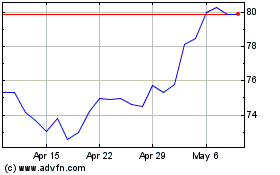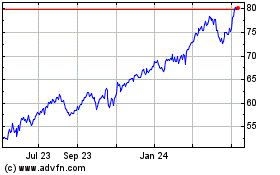AIG CEO Peter Hancock's Total Pay Fell 23% in 2016 -- Update
April 13 2017 - 5:16PM
Dow Jones News
By Leslie Scism
American International Group Inc. Chief Executive Peter
Hancock's total compensation fell 23% to $9.58 million last year as
the global insurance conglomerate suffered setbacks in its
profit-improvement plan.
Mr. Hancock has since resigned from the firm but remains at the
helm until a successor is named. He came under pressure from the
board as it feared a potential fight with billionaire investor Carl
Icahn if he wasn't replaced.
In a regulatory filing Thursday, AIG's board also disclosed that
hedge-fund manager and large shareholder John Paulson is leaving
the board "due to his other time commitments," while Samuel
Merksamer, a representative for Mr. Icahn, is standing for
re-election.
Both men joined the board last spring as AIG sought to avert a
public fight with the activist investors over ways to boost
shareholder returns. Mr. Paulson's Paulson & Co. hedge fund
sold nearly half its shares in the fourth quarter but still owned
4.55 million shares as of March 15, according to the AIG
filing.
For much of last year, AIG was making headway in improving its
profit margins, but the insurer closed the year with one of its
biggest quarterly losses since the financial crisis.
Mr. Hancock earned a base salary of $1.6 million, the same as in
2015, though the year-earlier compensation included an extra
payroll period to make it $1.66 million.
The CEO received no short-term-incentive pay compared with
year-earlier short-term incentive pay of $2.5 million. Mr. Hancock
did earn a long-term stock award, which is based primarily on share
performance compared with peers as measured over a three-year
period. Granted in March 2016, it totaled $7.85 million, down 4.6%
from the year before.
As previously reported, the board agreed to pay Mr. Hancock $5
million for his services during the transition period this year and
an additional $9.53 million as severance, on top of his regular
salary and incentive pay for 2017. The executive also will exit
with an estimated $38.3 million in unvested stock awards, which
were awarded between 2013 and 2016.
The exact amount payable from those stock awards depends on
AIG's share performance versus peers over the next several years.
That means Mr. Hancock's financial payout is tied partly to how
well his successor handles the job.
In a recent shareholder letter, nonexecutive Chairman Douglas
Steenland said the board "is actively engaged in the process of
identifying the right individual to serve as CEO."
AIG's board will shrink to 13 directors from the current 16, as
two other directors also won't stand for re-election: George L.
Miles Jr. and Robert S. Miller, both in connection with reaching
the board's general retirement age of 75. Mr. Miller, who joined
AIG's board in 2009 when it was struggling to repay a nearly $185
billion U.S.-taxpayer bailout, served as AIG's nonexecutive
chairman from 2010 through mid-2015.
While Mr. Hancock received no short-term incentive pay, the
board awarded more than $680,000 each to four top lieutenants. The
board cited the company's success in cutting costs and generating
more than $10 billion in planned or completed transactions to help
fund share buybacks.
Write to Leslie Scism at leslie.scism@wsj.com
(END) Dow Jones Newswires
April 13, 2017 17:01 ET (21:01 GMT)
Copyright (c) 2017 Dow Jones & Company, Inc.
American (NYSE:AIG)
Historical Stock Chart
From Mar 2024 to Apr 2024

American (NYSE:AIG)
Historical Stock Chart
From Apr 2023 to Apr 2024
